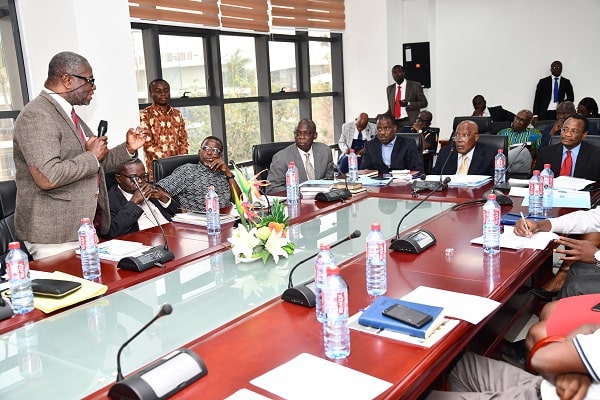The Ghana International Trade Commission (GITC), set up to check unfair trade practices, has begun the historic hearing of petitions brought before it by some local companies to protect them against some unfair practices by foreign companies.
At the commission’s first sitting on Thursday, Aluworks Limited prayed it to invoke its investigative and adjudicative powers against alleged unfair trade practices relating to dumping, subsidisation and tariff adjustments perpetrated by some foreign entities that threatened the company’s survival.
It was the case of the aluminium products manufacturer that Sunda International and Yai Tin International, both importers of aluminium products, illegally imported subsidised aluminium coils and circles into the country.
Aluworks also accused the entities of abusing the five per cent concessionary duty rates at the ports and also indulging in price undercutting, much to the disadvantage of local companies.
Reliefs
Aluworks, among other things, wanted the GITC to act on its mandate to create a level playing field, “whereby appropriate countervailing measures are instituted to equalise the effect of the rebates provided by exporting countries”.
It called on the GITC to take steps to compel the Customs Division of the Ghana Revenue Authority (GRA) to enforce the country’s laws to curb the importation of subsidised aluminium products, which amounted to dumping in the local economy.
Source of strength
Tema-based Aluworks is riding on the back of provisions in the rules and regulations of the World Trade Organisation (WTO) that require countries to institute measures to protect the dumping of imported goods and other unfair trade practices.
Petitions
Thursday’s sitting, chaired by Nana Dr Adu Gyamfi followed the successful investigation of the petitions filed by Aluworks and other entities in May last year.
Aluworks and three manufacturing organisations petitioned the GITC over unfair trade practices by foreign companies which enjoyed subsidies and export rebates in their home countries and flooded the Ghanaian market with cheap products.
They are the Association of Biscuit Manufacturers, the Cement Manufacturers Association of Ghana and the Steel Manufacturers Association of Ghana.
Statement of cases
The three-hour hearing saw the Chief Executive Officer (CEO) of Aluworks, Mr Kwasi Okoh, battle it out with the respondents, who were represented by the CEO of the Asadtech Group, Dr James Asare Agyei, who is also the immediate past President of the Association of Ghana Industries (AGI).
There were moments of back-and-forth, as the two parties engaged in fireworks of facts and evidence, with the Deputy Chair of the five-member GITC, Professor Paul Kuruk, intervening occasionally to restore order.
Unfairness
Mr Okoh stressed that unfair trade practices by the importers had significantly lowered Aluwork’s market share, resulting in poor cash flow and financial losses over the years.
“Aluworks is an important cog to the extended Bauxite Aluminium Scheme, but it is at risk because today, importing is far cheaper than manufacturing, and most entities are importing.
“Indian and Chinese traders are bending Ghana’s laws to facilitate their businesses and the continued encroachment of cheap goods from China has resulted in loss of businesses, huge loss of market shares, turnover and of productivity,” he said.
He said Aluworks, which used to produce and sell over 15,800 tonnes of aluminium products as of 2006, managed only 3,800 tonnes in 2018, indicating a loss in market share in excess of 75 per cent.
Mr Okoh made a case that the activities of the importers defeated the government’s initiative to build a robust aluminium industry and support local players in that sector.
Respondents’ defence
For his part, Dr Agyei, in the company of counsel, argued that the claims made by Aluworks that its economic misfortunes were the result of unfair trade practices by some importers were untenable and must be rejected by the GITC.
He said the challenges facing Aluworks were the result of inefficient operational systems, obsolete equipment and weak internal systems, not unfair trade practices by importers.
“Aluworks is not performing well because they have obsolete equipment. It is in our interest, and the interest of this country, to ensure that Aluworks works well, so that the government, the private sector and other players must be concerned about it.
“We need Aluworks to be competitive, but we reject the claims that unfair trade practices are making them less competitive. The challenges they face are self-inflicted,” he stressed.
Intervention
Prof. Kuruk assured both parties that the facts presented before the commission would be thoroughly analysed on merit for a final determination of the case.
He said whether to grant the reliefs being sought by the petitioners or not would be largely based on the evidence that had been adduced.
Historic, fulfilling
The Executive Secretary of the GITC, Mr Frank Agyekum, described the first-ever hearing of the commission as historic and fulfilling.
He said it would be meticulous in its activities and strictly apply due process to ensure that the right things were done to protect local businesses against unfair trade practices.
He said the commission would follow the WTO’s regulations to provide a level playing field for all businesses.
Background
The GITC was established by an Act of Parliament in September 2016 to regulate Ghana’s international trade architecture, in conformity with the rules and regulations of the WTO and other international trading systems and rules.
According to the GITC Act, 2016 (Act 926), its objectives include ensuring fair competition for persons engaged in domestic production and international trade, overseeing Ghana’s compliance with international trade rules and regulations, protecting the domestic industry or market from the impact of unfair trade practices and ensuring transparency, fairness, efficiency and objectivity in the application of measures affecting international trade and the use of world trade measures.
Graphic.com

Putting a spotlight on business, inventions, leadership, influencers, women, technology, and lifestyle. We inspire, educate, celebrate success and reward resilience.















